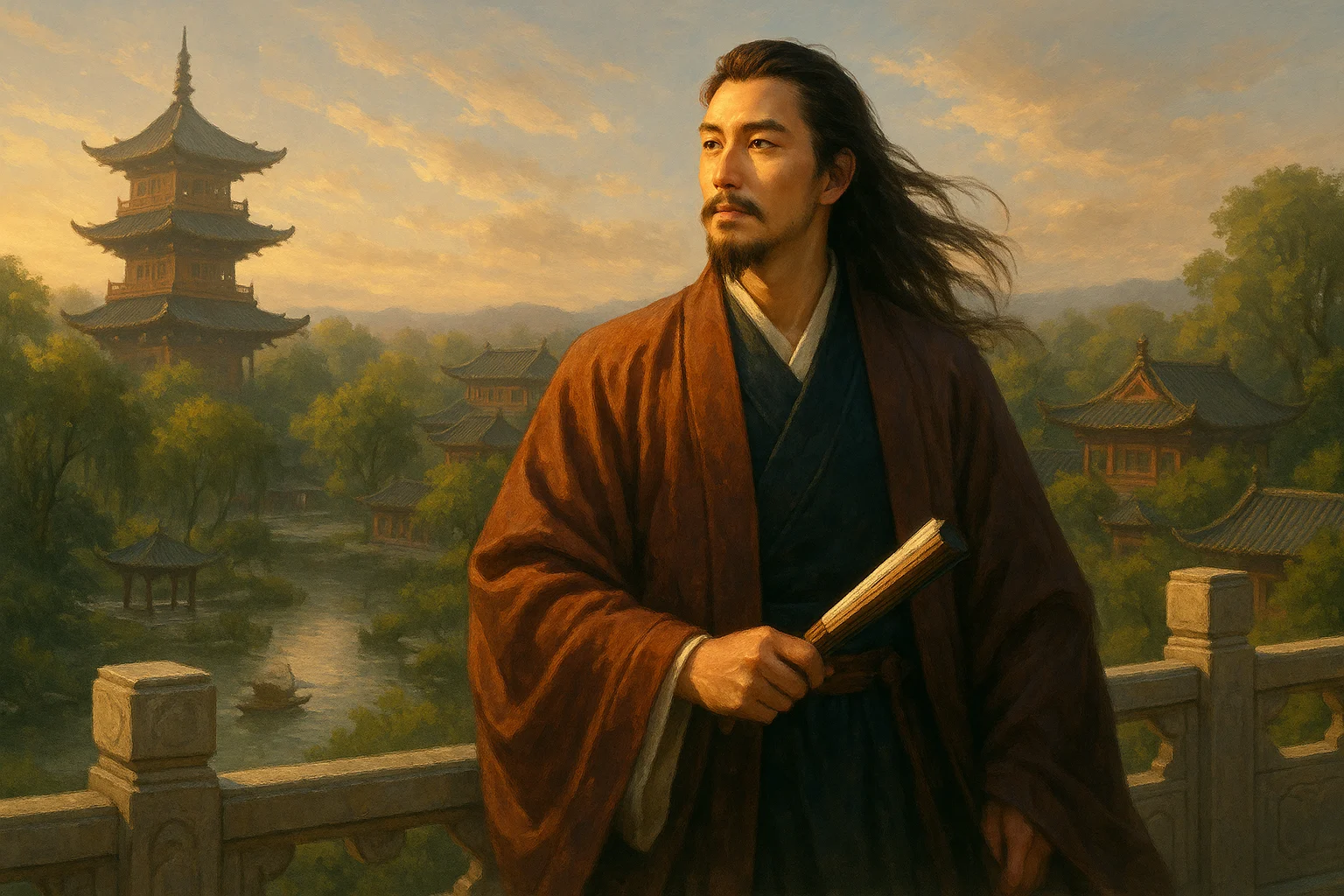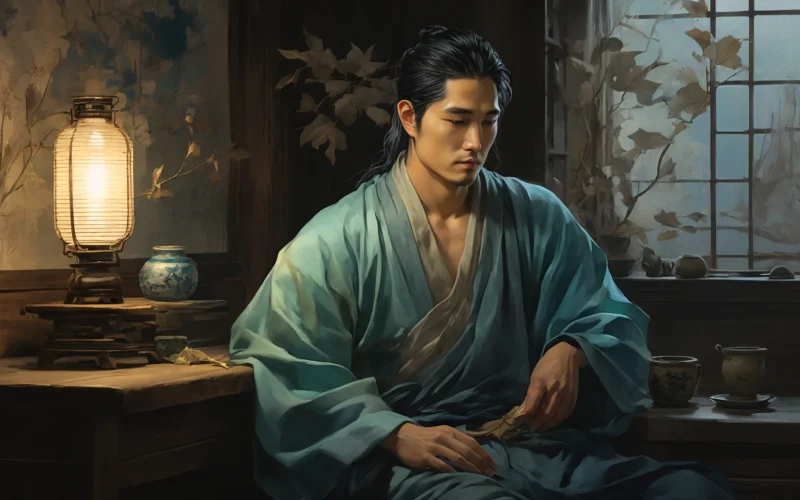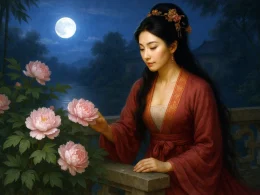A broken moon drips through the clepsydra,
One lamp dissects autumn's sickbed aura.
Ailing, I sense dew's early sting—
Dreams bypass miles wandering.
Seated, I chant time's cruel ode,
Standing, scan earth's grim color-code.
Cicadas flay the wayfarer's brain—
Sparse tung leaves clutch their rusting chain.
Original Poem
「葛溪驿」
王安石
缺月昏昏漏未央,一灯明来照秋床。
病身最觉风露早,归梦不知山水长。
坐感岁时歌慷慨,起看天地色凄凉。
鸣蝉更乱行人耳,正抱疏桐叶半黄。
Interpretation
This poem was composed by Wang Anshi either en route to a new official post or during his retirement retreat, at the Gexi Post Station in Yiyang, Jiangxi. The poet, possibly ailing or burdened with thoughts, finds himself physically and mentally exhausted during his travels. As a seasoned statesman weathered by political reforms, he pauses at this waystation and, under the solitary lamp of an autumn night, perceives an inner and outer chill that stirs his emotions, which he channels into the wind and dew. While ostensibly depicting autumnal scenes at a roadside inn, the poem harbors deep yearnings for home and anxieties about current affairs, weaving tender sentiments with far-reaching implications.
First Couplet: "缺月昏昏漏未央,一灯明来照秋床。"
Quē yuè hūn hūn lòu wèi yāng, yī dēng míng lái zhào qiū chuáng.
A waning moon dims as the water clock lingers at midnight,
a lone lamp flickers over my autumn-chilled bed.
The opening establishes a somber, desolate atmosphere. "Waning moon dims" (缺月昏昏) paints a faint, lackluster nightscape, while "water clock lingers at midnight" (漏未央) amplifies the solitude of deep night. "Lone lamp flickers" (一灯明来) introduces an interior scene where the feeble light interplays with the dim moonlight, rendering the "autumn-chilled bed" (秋床) even more desolate. This couplet sets the poem’s melancholic tone, mirroring the poet’s loneliness and mental exhaustion on his journey.
Second Couplet: "病身最觉风露早,归梦不知山水长。"
Bìng shēn zuì jué fēng lù zǎo, guī mèng bù zhī shān shuǐ cháng.
This sickened body feels the wind and dew arrive too soon;
my homeward dream forgets how long the mountains and rivers stretch.
Transitioning from scenery to introspection, this couplet reveals the poet’s physical ailment, which sharpens his sensitivity to seasonal changes. "Wind and dew arrive too soon" (风露早) not only marks autumn’s advance but also symbolizes life’s twilight and political stagnation. "Homeward dream" (归梦) blurs reality and illusion—though his heart races homeward, it remains only a dream. "Mountains and rivers stretch" (山水长) subtly conveys the arduous journey home and metaphorically alludes to life’s trials and tumultuous times. The fleeting nature of this dream deepens the poem’s wistful mood.
Third Couplet: "坐感岁时歌慷慨,起看天地色凄凉。"
Zuò gǎn suì shí gē kāng kǎi, qǐ kàn tiān dì sè qī liáng.
Sitting, I lament the years’ passing in a resolute chant;
rising, I find heaven and earth cloaked in desolation.
From nocturnal musings and dreams, the poet shifts to sober reflection. "Lament the years’ passing" (岁时) reflects his acute awareness of time’s flow, as the autumn chill signals life’s late season. "Resolute chant" (歌慷慨) is not just a mournful tune but an outcry over thwarted political ambitions. "Heaven and earth cloaked in desolation" (天地色凄凉) starkly contrasts with his dreams, laying bare his vast, melancholic thoughts and heightening the harmony between environment and emotion.
Fourth Couplet: "鸣蝉更乱行人耳,正抱疏桐叶半黄。"
Míng chán gèng luàn xíng rén ěr, zhèng bào shū tóng yè bàn huáng.
Cicadas shrill, grating the traveler’s ears,
clinging to sparse paulownia leaves half-yellowed.
The poem concludes with a focused scene—cicadas and paulownia leaves. Cicadas, typically summer creatures, sound particularly plaintive in late autumn. "Grating the traveler’s ears" (乱行人耳) reflects the poet’s unsettled mind, still far from his journey’s end. "Half-yellowed leaves" (叶半黄) mirror the poet’s "sickened body" and "years’ passing," reinforcing the theme of time’s passage. Symbolically, the cicadas’ clamor may represent political discord, while the sparse, yellowing leaves evoke ideals withering in isolation.
Holistic Appreciation
A quintessential travel-night meditation, this poem employs a cool palette to construct a quiet yet bleak tableau of moonlit autumn, a flickering lamp, wind, dew, and cicadas, reflecting the poet’s solitude, homesickness, and political disillusionment. Through scenic symbolism, dreamlike longing, and interplay of reality and illusion, the poem progresses from environment to body, dream to life, culminating in profound musings on fate and current affairs.
The transition between the second and third couplets is particularly striking: from physical ailment to emotional weight, from illusory dreams to resolute lament, the tone shifts from subdued to somber. Without directly addressing his political frustrations, Wang Anshi uses richly symbolic autumn imagery and personal sensations to unveil deeper metaphors about governance and existence.
Artistic Merits
- Realistic scenes, abstract emotions:
While the moon, lamp, wind, dew, cicadas, and paulownia are tangible, the poet’s expressions—dreams, sighs, recollections—blend reality with illusion, creating a layered style. - Cool tones, rich symbolism:
The poem’s palette leans toward gloom ("waning moon," "dim," "sparse paulownia," "half-yellowed"), evoking late autumn’s heaviness. Cicadas symbolize political clamor; paulownia leaves, fading ideals—hinting at the poet’s isolation amid turmoil. - Multi-perspective, dynamic rhythm:
From sitting to standing, dreaming to waking, hearing cicadas to seeing leaves, the poem engages multiple senses, its shifting rhythms mirroring emotional undulations. - Scene-emotion fusion, profound implications:
The autumn night’s imagery anchors reflections on time’s passage, bureaucratic struggles, elusive homecoming, and unrealized ambitions, blending depth with artistry.
Insights
This poem exemplifies a statesman’s "traveling meditation," using nature to voice philosophical insights on life’s impermanence and worldly hardships. It reminds us that amid illness, transience, and autumn’s withering, one should preserve inner "homeward dreams" and "resolute chants." Even in darkness and dew, ideals endure. Wang Anshi’s lyrical portrayal of a reformer’s steadfast spirit in solitude remains deeply moving.
About the Poet

Wang Anshi (王安石 1021 - 1086), a native of Linchuan in Jiangxi, was an outstanding statesman, writer, and thinker of the Northern Song Dynasty, counted among the "Eight Great Prose Masters of the Tang and Song Dynasties." His poetic achievements were particularly profound—his early works, filled with heroic language, revealed the ambition of a reformer. Though his ci poetry was few in number, it pioneered new realms of historical reflection. His poetry and prose combined intellectual depth with artistic value, and the over 1,500 works preserved in The Collected Works of Linchuan stand as a monumental testament to literary innovation in Song Dynasty literature.












